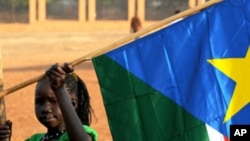One impact of two decades of war is that women now make up over 60 percent of the eight million people of South Sudan, says the Government of Southern Sudan's Ministry of Gender, Child and Social Welfare.
And while women fought alongside men during the conflict with the north, or helped the effort in other ways, after the ceasefire, many women feel they did not get the same recognition or respect as men.
Merekaje Lona is an activist for womens rights in South Sudan. She thinks that even the interim constitutional guarantee of one quarter of public positions going to women isn’t enough
“The issue of 25 percent, I am not satisfied with it in two ways: one, women in participation in the nation cannot only be 25 percent; two, the 25 percent has not been implemented in the correct way, therefore I feel there is a lot that needs to be done. We need to get to know, to identify, the competent women and have them compete with men and implement the 25 percent as affirmative action,” said Merekaje Lona, an activist for women’s rights in South Sudan.
The south Sudan interim constitution and 2005 Comprehensive Peace Agreement (CPA) provides for affirmative action, stipulating at least 25 percent female participation in public life and their representation in the legislative and executive organs. However, many women in the soon to be independent nation are dissatisfied because they are not yet adequately represented in the government and in other key decision-making positions.
The southern ruling party, the SPLM, did promise to increase the 25% female participation rate to 30% during last year’s election campaign. But Beatrice Aber, an SPLM Member of Parliament in the southern assembly said that promise needs to be formalised.
“The 25% affirmative action is definitely not enough and we need the pledged 30% to be enshrined in the constitution currently under going review,” Aber said.
Low literacy rates and prevailing traditional roles of women remain a hindrance to their meaningful participation in political leadership. This has appallingly affected the women’s participation in the country’s governing institutions.
Nevertheless, Suzzana Jambo a special advisor on gender issues during the CPA negotiations, appealed to women to push for more than 30 percent.
She admitted that the region still lacks skilled and educated women who can fill government positions.
According to Benjamin Marial, the southern minister of information, the government’s efforts to women should be appreciated
“We have already 30 % of women in the parliament,” he said. “We have even gone beyond 25%.
He called for patience among women, asserting that over the past five years in power, the government has been able to introduce the concept of affirmative action, a completely new idea for most south Sudanese.
There are widely varying levels of understanding of human and women’s rights in South Sudan, with more awareness among the small urban elite than the much larger numbers of women in the vast rural areas. All of which make the challenge promoting women’s rights within government and its institutions and difficult one, but one that women activist say is a key to the prosperity of the new nation.
South Sudan Activists Say : Women Need Bigger Role

Activists say women, who make up more than half of the population, need more than 25% of official positions



